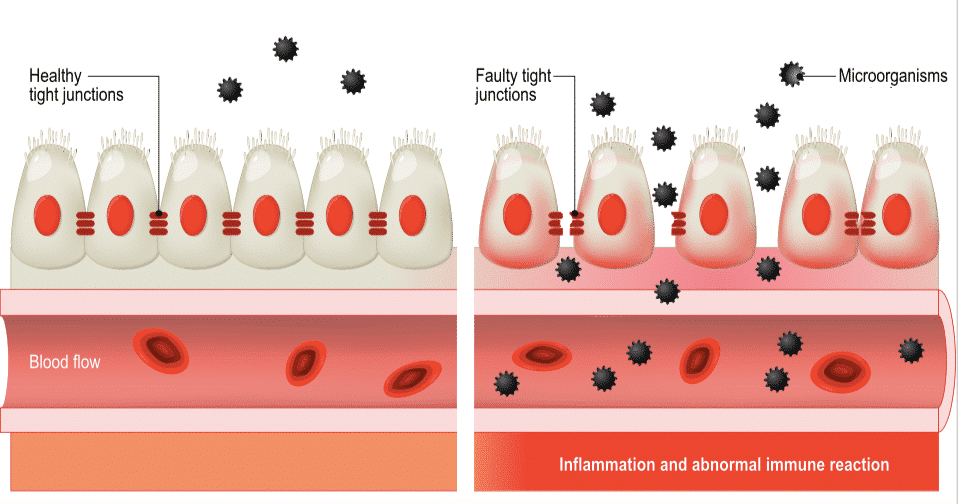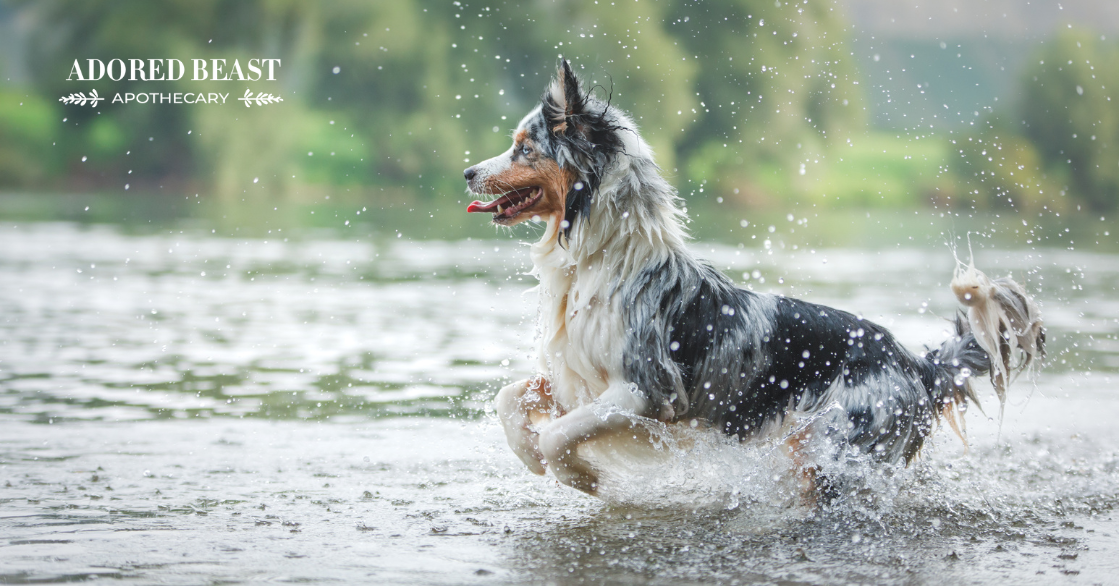The new buzz phrase in the world of pet health (and human health for that matter) is leaky gut syndrome. Sound scary? It is!
I’ll tell you why and what you can do about it to regain your dog’s health and happiness. Spreading the word about leaky gut through my own experience is very important to me.
I often seem to find myself speaking from what I like to call “a place in the trenches” or “empirical proof“ – but then I’m quickly reminded by my long-term animal health team that it more often comes from a place of “you just had to figure it out.”
Early Experience With Leaky Gut Syndrome
I’ve been recommending raw dog food since 1994 and have seen unimaginable health improvements in dogs switched from kibble to a fresh, whole food, species-specific diet.
As my practice evolved and years went by, I began to see more and more patients who’d already transitioned to raw food. In the last few years I’ve also started to see more and more dogs suffering from allergies, auto-immune diseases and, of course, cancer.
There were many times when I sat at my veterinary clinic long after my clients had gone home, scratching my head about why we were seeing an influx of these diseases when many dogs were on a beautiful raw food diet.
Why did some dogs do so well for so long, then all of a sudden start to react with an inflammatory response?
Why were some of them okay on a novel protein diet but then had sudden reactions to all proteins, including the ones that had tested negative on allergy tests six months prior?
Then there were the ones who were allergic to trees, grass, mites, and other environmental factors.
One day I was geeking out on the physiology of a cat patient who had interstitial cystitis (when the lining of the bladder starts to leak). I realized that if the mucosal lining of the bladder can leak, then so can the mucosal lining of the gut.
This could explain why all these dogs were over-reacting to so many foods and environmental allergens.
We had amazing results treating interstitial cystitis in cats, so I started working on dogs with skin conditions using a similar protocol to the one I came up with for the cats. And it worked!
What is Leaky Gut?
Leaky gut syndrome is an increasingly widespread condition in both animals and humans, yet it’s still not well known in the medical community.
Leaky gut in dogs is exactly what it sounds like. The delicate intestinal mucosa that lines the gut and allows tiny digested nutrients to pass through to the bloodstream can be likened to cheesecloth or a tea strainer. This is how nutrition is assimilated into the body – but this lining also acts as an incredibly important barrier to keep out toxins, pathogens and undigested food particles.
When the mucosa becomes traumatized and inflamed, it causes the junctions (the spaces in the cheesecloth) to become stretched or damaged to the point where they’re no longer able to filter out larger food particles, bacteria, and toxins. These substances can now pass through the intestinal wall and make their way into the bloodstream and lymphatics.
This sets off a series of events in the body, which begins with the liver working overtime to screen out the particles; it has no chance of keeping up with the onslaught, and the pathogens begin to accumulate.

The immune system is then triggered to fight the intruders, but it too becomes overwhelmed, leading to particles being absorbed into body tissues.
This causes inflammation; but even worse, the immune system can attack these intruders, which can lead to autoimmune disease.
The body starts to perceive food as its enemy – the reason we see so many dogs who are allergic or reactive to almost every protein and many vegetables and grains.
This leaves little to choose from when it comes to feeding, in addition to the challenges of allergies to grass, pollen and more; but more importantly, and sadly, the result is an animal who’s in a chronic and constant state of inflammation and distress.
Causes Of Leaky Gut In Dogs
In my opinion, there are 4 main causes of leaky gut syndrome.
1. Poor Diet
Diet plays a big role in the development of leaky gut. Specifically highly processed, grain-based foods containing wheat, rice, spelt and soy, food additives and preservatives; the lectin found in unsprouted grains; sugar; genetically modified foods (GMOs); pasteurized dairy; and meat from stressed factory-farmed animals.
2. Drugs and Other Toxins
This category includes the unnecessary use of steroids, non-steroidal anti-inflammatories (NSAIDs), deworming drugs, flea and tick treatments (many contain pesticides) and antibiotics (leading to an imbalance of healthy gut flora, also known as dysbiosis).
3. Over-vaccination
When the body is forced to respond to a vaccine to which it has already established antibodies, this wreaks havoc on the immune system and can cause a number of chronic diseases.
4. Chronic Stress or Boredom
These can also influence gut health.
Not getting enough exercise or mental stimulation, or being left home alone for long periods, can be a major cause of stress for a pack animal. Stress negatively affects the immune and digestive systems.
Why is Leaky Gut So Scary?
It’s because it’s hidden!
You can see trauma in a joint by watching your dog limp, or on the skin as a lesion or wound. We treat the trauma… it’s pretty simple.
But gut trauma is hidden trauma and we can’t fix what we can’t see! Because it’s left untreated and unhealed, it becomes more chronic and more dangerous to your dog’s overall health.
You start to see symptoms that in conventional medicine are diagnosed as a disease or infection. Treatment begins for that disease and the hamster wheel starts spinning. You may see the symptoms disappear but then they return.
A recurring ear infection may clear up, but then the dog suffers disorders like hot spots, full blown allergies or hypothyroidism. In many cases, this is because the initial trauma causing the disease – leaky gut syndrome – is not healed… because you can’t see it.
Leaky gut has been referred to as the “great mimicker,” appearing in the form of many chronic diseases that plague our beloved animals. Examples include (but are not limited to):
- Diseases of the skin (allergies), thyroid, joints, heart disease, spinal cord, eyes or brain
- Inflammatory bowel disease, interstitial and chronic cystitis, collapsing trachea, laryngeal paralysis, liver, gallbladder and pancreatic disorders.
- Behavior problems such as aggression and obsessive-compulsive disorders or self-mutilation.
- Autoimmune disease and nutritional deficiencies, which, left untreated, could lead to some forms of cancer because of the chronic inflammation.
Your dog’s gut is responsible for more than 70 percent of her immune system and is directly responsible for the absorption of all that amazing food you’re feeding her. With an unhealthy gut, no amount of raw food or nutrients will support her health and longevity, let alone heal something like an allergy.
How to Prevent Leaky Gut Syndrome
Help prevent leaky gut with these 5 steps:
- Stop feeding processed foods and feed a raw, species appropriate diet.
- Stop routine vaccinations. Instead, ask your vet for blood titer tests to measure antibody levels. Get a copy of the results and ask a holistic vet to interpret them, as there are differing opinions on what the results actually mean.
- Stop using chemical flea and tick products that contain pesticides. Use natural products and protocols with proven success.
- Stop all drugs where possible.
- Determine your dog’s source of stress. Make the time to go for longer walks or hire a dog walker or someone to check in on them during the day or even add a playmate.
Healing Leaky Gut
This natural protocol that supports the healing of your dog’s gut is so helpful and safe for overall health that even without a diagnosis you can go ahead and follow it for six to eight weeks with any dog.
It will serve to support a much healthier digestive system, resulting in a healthier body and a happier dog. This is a food protocol and does not include supplements.
Kefir or Raw Live Yogurt – Look for products from Jersey cows, goats or use coconut kefir. Give 2 Tbsp daily for an average (30 to 50 lb) size dog
Fermented Vegetables – Fermented foods are easier to digest than raw or cooked vegetables, and the gut doesn’t have to work as hard to break them down and absorb the nutrients from them. Work up slowly to 1 to 3 tsp a day for every 20 pounds of body weight. Here’s how we make them.
Bone Broth – Ideally, make your broth from wild game like deer, moose and pheasant (they have the healthiest bones) or from ethically raised, free-range animals. Bones contain: proline, which tightens and builds cell structure; glycine, which supports the synthesis of collagen (which gives your dog a strong cell structure and supports skin and veins); gelatin, glucosamine and minerals, which are the building blocks of the digestive system. Give 1 tbsp per day to small dogs, 2 tbsp for medium, 3 tbsp for large dogs, and 4 tbsp for giant breeds. Here’s our recipe.
Phytoplankton – Phytoplankton is single celled and the most complete whole food nutrition on the planet. It’s very helpful with leaky gut because its smaller than a red blood cell and will supply amino acids, micronutrients, and protein while your dog’s gut is healing. It’s very important to choose a reputable source that’s non-GMO, grown on land and watered with Atlantic ocean water that’s been filtered for heavy metals – and no fillers! If you find a good source, you’ll only need 1/16 to 1/8 of a tsp per day.
Coconut Oil Or Hemp Oil – Use coconut oil or hemp oil to supply medium-chain fatty acids. They’re also easier to digest than fish oils without the risk of rancidity. Make sure your oil is non-GMO, grown without herbicides or pesticides, cold pressed, hexane-free, unrefined and unbleached. Give 1 tsp per 10 pounds of body weight but start with ¼ tsp and work up over a two to three week period.
I strongly recommend giving supplements only for a limited time and NOT long term, as well as in small amounts, used synergistically to strengthen the body for long term benefit.
When it comes to leaky gut syndrome, be informed and empowered to take the health of your adored pet into your hands!












